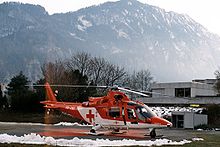 | |||||||
| |||||||
| Founded | 1952 | ||||||
|---|---|---|---|---|---|---|---|
| Fleet size | 21 | ||||||
| Headquarters | Zürich, Switzerland | ||||||
| Website | www.rega.ch | ||||||




Swiss Air-Rescue (German: Schweizerische Rettungsflugwacht, French: Garde aérienne suisse de sauvetage, Italian: Guardia aerea svizzera di soccorso, Rega) is a private, non-profit air rescue service that provides emergency medical assistance in Switzerland and Liechtenstein.[3][4] Rega was founded on 27 April 1952 by Rudolf Bucher, who believed that the Swiss rescue service needed a specialized air branch.[5] Rega mainly assists in mountain rescues, but also operates in other terrains when necessary, especially in life-threatening emergencies. Rega also provides a repatriation and medical advice service for members who experience a medical emergency while abroad and local treatment is not available.
Rega also aids alpine farmers during the summer months in rescuing livestock and retrieving dead animals.
As a non-profit foundation, Rega does not receive financial assistance from any government. They are quite unusual within Europe, with the majority of their costs paid through the annual fees of private contributors (As of 2016: 3.2 million patrons, 38% of the population). In exchange, Rega does not charge its contributors for its search, rescue and repatriation costs. One other rare aspect of Rega is that people in distress can call for a helicopter rescue directly (phone number 1414). In case of insufficient mobile phone coverage, alpinists can also use emergency radio telephone (161.3 MHz).
The head office, the Rega Centre, (home to the Rega operations center where all missions are coordinated) is a hangar located at the northeast section of Zurich Airport within the municipality of Kloten;[6] the hangar has direct access to the runways of the airport.[7] All Rega helicopters carry a crew of three: a pilot, an emergency physician, and a paramedic who is also trained to assist the pilot for radio communication, navigation, terrain/object avoidance, and winch operations. In some situations, such as evacuating cable cars or retrieving injured climbers from a rock face, the crew also consists of a specialist trained by the Swiss Alpine Club.
In the Canton of Valais, helicopter search and rescue is carried out by Air Glaciers and Air Zermatt
- ^ "JO 7340.2H - Contractions" (PDF). FAA. Retrieved 23 May 2020.
- ^ "JO 7340.2H - Contractions" (PDF). FAA. Retrieved 23 May 2020.
- ^ Rega Missions
- ^ Landespolizei Liechtenstein > Notrufnummern
- ^ Air-Rescue, Rega-Swiss. "The beginnings of air-rescue". www.rega.ch. Retrieved 2020-08-27.
- ^ "anfahrtsplan_rega_center_en.pdf" (Archive) Rega. Retrieved on March 16, 2014. "Address for route guidance systems: Bimenzältenstrasse 87 / 8302 Kloten" - See in: German, French, Italian
- ^ "Rega Centre." (Archive) Rega. Retrieved on March 16, 2014.